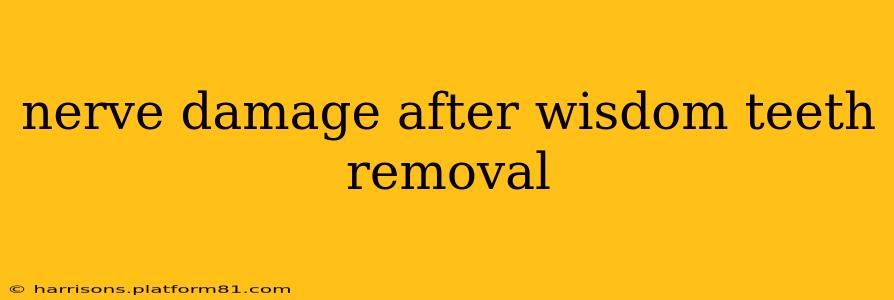Wisdom teeth removal is a common procedure, but like any surgery, it carries potential risks. One of the most concerning complications is nerve damage. While relatively uncommon, understanding the possibility, causes, symptoms, and recovery process is crucial for anyone considering this surgery. This comprehensive guide will address your concerns and provide valuable information on this topic.
What Causes Nerve Damage During Wisdom Teeth Removal?
The proximity of the inferior alveolar nerve (IAN), which provides sensation to the lower lip, chin, and teeth, to the lower wisdom teeth is the primary reason for the risk of nerve damage. During the extraction, especially if the teeth are impacted or deeply rooted, the nerve can be inadvertently stretched, compressed, bruised, or even severed. The upper wisdom teeth are less likely to cause nerve damage due to different nerve pathways.
How Common is Nerve Damage After Wisdom Teeth Removal?
The incidence of IAN nerve damage following wisdom teeth extraction is relatively low, estimated to be between 0.2% and 2% of cases. However, the potential impact on quality of life is significant, making understanding the risk crucial. Factors like the complexity of the extraction, the surgeon's experience, and the individual patient's anatomy can influence the likelihood of this complication.
What are the Symptoms of Nerve Damage After Wisdom Teeth Removal?
Symptoms can vary depending on the severity of the nerve damage. They might include:
- Numbness: This is the most common symptom, affecting the lower lip, chin, and sometimes the tongue.
- Tingling: A pins-and-needles sensation in the affected area.
- Pain: Sharp or burning pain in the lower lip, chin, or tongue.
- Altered Taste: Changes in the perception of taste, often described as a metallic taste or altered sweetness.
- Weakness: Difficulty moving the muscles in the chin or lower lip.
It’s crucial to note that these symptoms can be subtle initially, gradually worsening, or even appearing weeks after the surgery.
Can Nerve Damage After Wisdom Teeth Removal Be Permanent?
The duration and severity of nerve damage are highly variable. In most cases, the damage is temporary and resolves spontaneously within weeks, months, or even a year. However, a small percentage of patients experience permanent nerve damage, meaning the numbness or other symptoms persist long-term. The extent of the damage, the patient’s individual healing capabilities, and the promptness of appropriate treatment all influence the outcome.
What Happens if I Experience Nerve Damage After Wisdom Teeth Removal?
If you experience any of the symptoms described above, it’s crucial to contact your oral surgeon immediately. They will assess the situation, possibly using imaging techniques, and discuss appropriate management. Treatment might include:
- Observation: For mild, temporary symptoms, watchful waiting might be recommended.
- Medication: Pain relievers, anti-inflammatory drugs, and in some cases, nerve-stabilizing medications can be prescribed.
- Physical Therapy: In some instances, specialized physical therapy techniques can aid in nerve regeneration.
- Surgical Intervention: In rare cases of severe or persistent damage, surgical intervention might be necessary to repair the nerve or address underlying issues.
How Can I Reduce the Risk of Nerve Damage During Wisdom Teeth Removal?
Choosing an experienced and skilled oral surgeon is paramount in minimizing the risk of complications, including nerve damage. Thorough preoperative imaging and planning are vital to assess the anatomical relationship between the teeth and nerves. Open communication with your surgeon about any concerns is crucial.
How Long Does It Take for Nerve Damage to Heal After Wisdom Teeth Removal?
Recovery time varies greatly. While some experience complete recovery within weeks, others may need several months or even longer. Complete healing is influenced by the severity of the damage and individual healing rates. Regular follow-up appointments with your oral surgeon are crucial for monitoring progress.
What are the Long-Term Effects of Nerve Damage After Wisdom Teeth Removal?
While most cases resolve completely, persistent nerve damage can impact quality of life. Long-term effects might include chronic pain, numbness, difficulty eating, and diminished sensation in the lower lip and chin. However, with appropriate management and support, many individuals can effectively adapt to these changes.
This information is for educational purposes only and should not be considered medical advice. Always consult with a qualified healthcare professional for any health concerns or before making any decisions related to your health or treatment.
